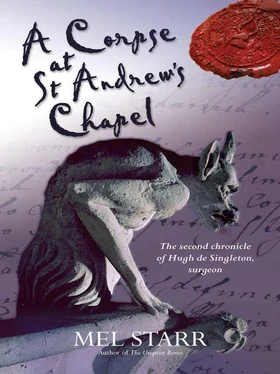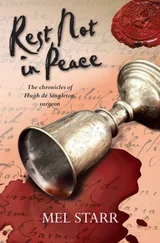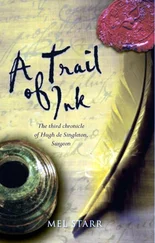Mel Starr - A Corpse at St Andrew's Chapel
Здесь есть возможность читать онлайн «Mel Starr - A Corpse at St Andrew's Chapel» весь текст электронной книги совершенно бесплатно (целиком полную версию без сокращений). В некоторых случаях можно слушать аудио, скачать через торрент в формате fb2 и присутствует краткое содержание. Год выпуска: 2010, Издательство: Kregel Publications, Жанр: Исторический детектив, на английском языке. Описание произведения, (предисловие) а так же отзывы посетителей доступны на портале библиотеки ЛибКат.
- Название:A Corpse at St Andrew's Chapel
- Автор:
- Издательство:Kregel Publications
- Жанр:
- Год:2010
- ISBN:нет данных
- Рейтинг книги:5 / 5. Голосов: 1
-
Избранное:Добавить в избранное
- Отзывы:
-
Ваша оценка:
- 100
- 1
- 2
- 3
- 4
- 5
A Corpse at St Andrew's Chapel: краткое содержание, описание и аннотация
Предлагаем к чтению аннотацию, описание, краткое содержание или предисловие (зависит от того, что написал сам автор книги «A Corpse at St Andrew's Chapel»). Если вы не нашли необходимую информацию о книге — напишите в комментариях, мы постараемся отыскать её.
A Corpse at St Andrew's Chapel — читать онлайн бесплатно полную книгу (весь текст) целиком
Ниже представлен текст книги, разбитый по страницам. Система сохранения места последней прочитанной страницы, позволяет с удобством читать онлайн бесплатно книгу «A Corpse at St Andrew's Chapel», без необходимости каждый раз заново искать на чём Вы остановились. Поставьте закладку, и сможете в любой момент перейти на страницу, на которой закончили чтение.
Интервал:
Закладка:
Kellet’s complaints covered the sound of my entry and approach, so that I stood quite close to the man and heard his words clearly. “Damn him…he’ll pay. An’ the others, too. Damn him. Henry got hinges…I’ll have more’n that. Damn him…he’ll pay…a penny…no, tuppence a month or I’ll see that all know.”
“All know what?” I asked.
The priest jerked as if Edmund had boxed his ears. His head snapped back, his eyes opened wide with fear, and he leaped to his feet — a move which surprised me, given the size and apparent affliction of his belly.
The beam of light from the open door was behind me. My face was in shadow, my form silhouetted against the light. I believe the priest thought for a moment that the blacksmith had followed him to the chapel and overheard his groaning threats. But my form is nothing like that of Edmund, which Kellet quickly noted. His hands had flown up to protect his paunch, but fell when he realized he was not in danger of another blow.
“Who…who is’t?” he stammered.
“’Tis Hugh. I congratulate you, for having the forethought to prepare sufficient padding against this day.”
“Padding?”
“I saw you suffer Edmund’s blow. Will you complain of him to the bishop? Or present a charge at hallmote? I am your witness, whichever you choose.”
“I, uh, am undecided,” the priest whispered.
“What was it caused Edmund to strike you? I saw from a distance your conversation with him, and then the blow.”
“Uh…’tis a private matter.”
“Hmmm. Edmund said much the same.”
“You spoke to him?” the priest asked quickly, with, I thought, some alarm in his voice.
“Aye. He said little. Said you and he had an ‘understanding.’ I fail to understand an understanding sealed with a blow.”
“A private matter,” the priest asserted again. “Uh…from the confessional.”
“Edmund confesses at the chapel?” I asked with, I suspect, some incredulity in my voice.
“He did…but no longer, I think,” Kellet spoke somewhat ruefully, and rubbed his bruised gut as he did so.
“So you will let this attack pass?”
“Aye. Scripture demands of us to turn the other cheek,” the priest said with a sigh. He sat, clumsily, again on the steps leading to the tower room. Indeed, we have two cheeks to offer for blows, but only one belly. What must a man offer next when struck there? I am no philosopher, nor theologian. I let the thought pass.
I was unwilling to leave the chapel with such incomplete knowledge of things happening in my bailiwick. “The confessional, you say? Why would words spoken in confidence lead to blows on the street?” I wondered aloud.
The priest did not answer.
“Did you demand of him a penance too harsh?” I thought, given what I had learned of Kellet and his practice, that this was unlikely. But I saw no other possibility, at the moment.
“Aye,” the priest muttered. “’Twas much as you say.”
Kellet stood to his feet and spoke. “I can say no more.” And with those words he turned and lumbered up the darkening stairway to his tower chamber. I watched him disappear into the gloom and heard the chamber door creak open, then close with the drop of a latch.
It was pleasant to re-enter the brightness and warmth of a sunny June afternoon after the shadows of the decaying chapel. But the brilliance of the day did nothing to enlighten me regarding what I had seen this day, or what John Kellet might have learned or assigned at the confessional.
I walked slowly toward Bampton, partly because my thoughts were occupied, partly because I had no other pressing business, and partly because I enjoyed the warmth of the lowering sun in my face. The day was of the type for which June is justly admired. If a man wished to be warm he had but to stand or work in the sun and his desire would be met. Did he wish to cool himself he might seek a tree or shady wall and the breeze would accomplish the task.
Lord Gilbert knew nothing of the deaths of Alan the beadle and Henry atte Bridge — unless some whispered gossip had traveled past the marcher country all the way to Pembroke. I had thought to await his return to Bampton to tell him of these events. It was my hope that I would then also be able to present him with the conclusion to the business. As I ate my supper that day I concluded that no such resolution was in view.
I entered my chamber, set a sheet of Robert Caxton’s parchment on my table, and with quill in hand composed a letter to Lord Gilbert in which I described events in Bampton since Holy Week.
Doing so was a rewarding experience. The effort to reduce the incidents so that the report could be written on but one sheet of parchment focused my mind wonderfully. It was necessary to dispense with all evidences not material to discovering the truth of things, else the tale would be too long.
The long summer twilight was near gone when I set down my quill, folded and addressed the message to Lord Gilbert Talbot at his castle at Pembroke, and sealed it with a drop of sealing wax and Lord Gilbert’s crested seal from my cupboard. I would dispatch two grooms to carry the missive to Pembroke tomorrow. Lord Gilbert might require more men to assist his move to Bampton after Lammas Day. The fellows could remain at Pembroke until then.
My bed beckoned, but so did the puzzle of Alan and Henry. I knew that should I attempt sleep, my mind would churn over the thoughts I had distilled in the letter to Lord Gilbert. Better I should reflect on these things while alert and vertical. I departed my chamber and crossed the castle yard to the steps beside the gatehouse which led to the parapet. Wilfred watched me approach and tugged a forelock.
The night was near full dark. Only a faint glow in the northwest sky silhouetted the forest beyond the Ladywell. This glow would soon reappear to the northeast, for we approached the shortest night of the year.
In my circumnavigation of the parapet I lingered above the addition to the marshalsea. The new stables were below me, the new-thatched roof glowing dimly in the starlight.
I wonder if God intervened to halt my steps above the marshalsea. Certainly, had I maintained a steady pace round the castle wall, I would have been walking north along the east wall, rather than south atop the west wall, when a dark figure strode purposefully to the west on Mill Street.
I saw the shadowed form hastening along the road but I would likely not have noticed even that, but the walker carried a pale sack over a shoulder. It was the bouncing movement of the sack in the starlight which caught my eye. Only after I focused on that did I see the obscure form of a walker disappearing against the black rim of Lord Gilbert’s forest to the west.
I was just past the gatehouse, beginning a second circuit of the castle wall, when I spied this hurrying shadow. I hurried to retrace my steps, ran down the stairs to the gatehouse, and awakened Wilfred, who was now snoring in his chamber behind the portcullis.
The porter reacted hesitantly to my command, for when the gate was closed and the portcullis down for the night they generally stayed that way until dawn. Some time passed before I was able to shout the cobwebs from Wilfred’s mind and convince him that he must draw the portcullis and open the gate for me.
By the time he accomplished these tasks and I stumbled through the night to Mill Street, the walker had disappeared into the shadows where the path to Alvescot bent into the forest. There was nothing to be seen beneath the oaks and beeches of the wood.
I assumed some man of the town was setting out to lay snares, or check those already placed, in hope of one of Lord Gilbert’s coneys for his dinner. The man had escaped John Prudhomme’s notice and it seemed had escaped me as well, for in the time it took me to get from the castle parapet to the street before the castle, the fellow had disappeared.
Читать дальшеИнтервал:
Закладка:
Похожие книги на «A Corpse at St Andrew's Chapel»
Представляем Вашему вниманию похожие книги на «A Corpse at St Andrew's Chapel» списком для выбора. Мы отобрали схожую по названию и смыслу литературу в надежде предоставить читателям больше вариантов отыскать новые, интересные, ещё непрочитанные произведения.
Обсуждение, отзывы о книге «A Corpse at St Andrew's Chapel» и просто собственные мнения читателей. Оставьте ваши комментарии, напишите, что Вы думаете о произведении, его смысле или главных героях. Укажите что конкретно понравилось, а что нет, и почему Вы так считаете.












